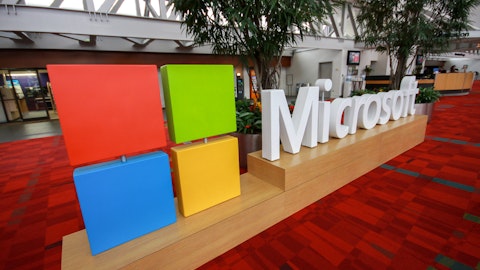In this article, we are going to list the 15 biggest tech hardware companies in the world. We will analyze the hardware industry, possible growth catalysts for hardware stocks and the overall outlook for the industry. You can also skip this discussion and see the 5 biggest tech hardware companies in the world.
Computer hardware market is experiencing a spectacular rise amid the coronavirus-induced demand. Trends that are fueling the computer hardware industry include work from home, remote learning, Cloud computing, AI, increasing PC shipments, gaming and entertainment. According to research firm Gartner, worldwide PC shipments increased 9% year over year in the third quarter of 2020. Overall, PC shipments jumped 3.6% to 71.4 million units in the third quarter, fueled by a 11.4% rise in U.S. This was the first time in a decade that the region saw a double-digit growth.
The global computer hardware market is anticipated to grow from $862.93 billion in 2020 to $944.09 billion in 2021 at a compound annual growth rate (CAGR) of 9.4%. North America was the largest region in the global market for computer hardware, accounting for 43% of the market in 2020. The tech hardware market is expected to be powered by a rapid increase in investment in smart city projects in many countries around the world. Smart city innovations use information and communication technologies to organize urban services efficiently, including transport systems, water supply, and law and order.
Hardware in tech terms refers to the physical parts of a computer and related devices. It can be categorized into internal hardware (motherboards, RAM, HDD, SSD, graphic cards, power supply) and external hardware (monitor, keyboard, scanner, printer). Hardware refers to the tangible parts of a computer device needed to store and run the software. The hardware is the delivery platform of the written instructions provided by the software. On the other hand, the software is intangible which consists of operating systems, programs, and applications that need to be installed on the computer. You can check out the 15 biggest software companies in the world on a separate list.
Computer hardware industry experienced a massive growth over the course of a century. In 1946, the first computer, Electronic Numerical Integrator and Computer (ENIAC) was built in the U.S. It weighed more than 27 tons and had over 17,000 vacuum tubes, 70,000 resistors, 10,000 capacitors, 6,000 switches, and 1,500 relays. Today, massive computing power has been narrowed down to chips the size of pins.
In the last few years, the tech hardware sector has faced major shifts in areas such as graphics processing and virtual reality. Moreover, the Internet of Things (IoT) is gaining momentum as the next major trend in the computer market with the potential to establish an impact across the business spectrum. IoT and AI will fuel the demand for hardware companies. Data from McKinsey shows that by 2025, AI-related semiconductors could account for about 20% of the total hardware demand. This translates into $67 billion in revenue.

The tech industry offers investors endless opportunities. The hardware sector specifically promises thriving numbers in the years to come. This is why we created a list of the 15 biggest tech hardware companies in the world. We gathered each company’s value in terms of revenue, market cap, assets, and the number of employees sourced from Forbes. We then ranked these tech hardware companies from the lowest to highest financial value.
Let’s take a look at the biggest tech hardware companies in the world.
15. Quanta Computer Inc. (TWSE: 2382.TW)
Revenue: $33.3 billion
Market cap: $8.4 billion
Assets: $20.5 billion
Number of employees: 70,000
Headquarters: Taoyuan, Taiwan
Quanta Computer, founded in 1988, is one of the Global Fortune 500 Companies and also one of the world’s leading manufacturers of notebooks. Quanta is also involved in cloud computing, enterprise network solutions, mobile communications products, smart home products, smart healthcare, IoT, and AI applications.





